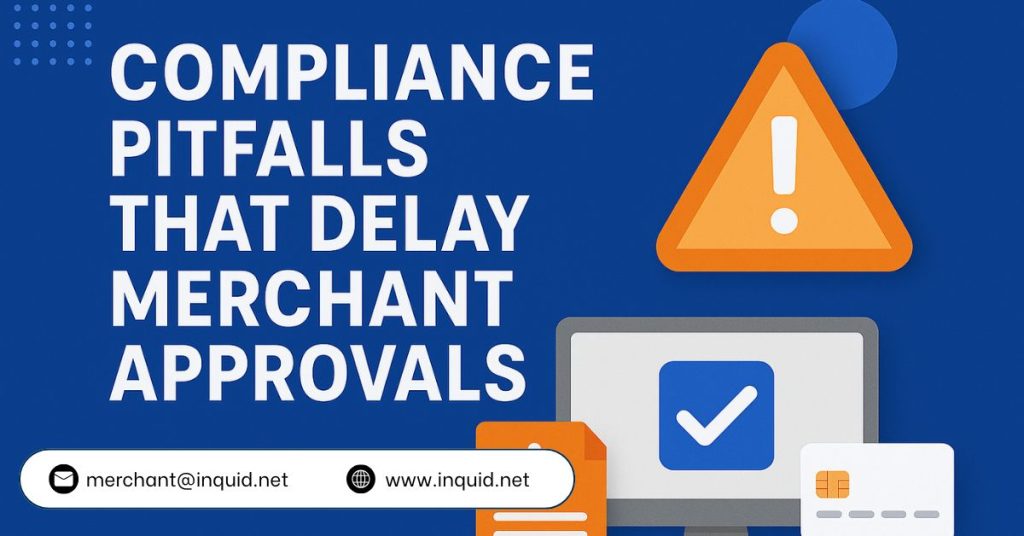
Getting approved for a merchant account can be a challenge, especially for businesses that operate in industries considered high-risk. While processing history and financial stability matter, compliance pitfalls in merchant approvals are one of the biggest reasons applications face delays or outright rejections. Many merchants underestimate how regulators, banks, and processors assess risk through compliance checks, which makes approval timelines longer than expected.
In this blog, we’ll look at the most common compliance pitfalls that hold up approvals and what merchants can do to stay ahead of them.
Ignoring KYC and Documentation Requirements
One of the first steps in the approval process is meeting Know Your Customer (KYC) standards. Providers require detailed documentation to confirm the legitimacy of the business, including incorporation records, identification of directors, proof of business location, and in some cases, financial statements.
Delays often happen when merchants submit incomplete or outdated paperwork. A mismatch between business names on bank accounts and registration documents is another common error. Keeping these details aligned can significantly improve the chances of a smooth review.
For businesses looking to avoid these holdups, following practical high-risk payment processing tips can make the application journey less stressful.
Overlooking Regulatory Obligations
Different countries have different rules for processing payments, especially for industries flagged as high-risk. For example, gaming, forex, and adult businesses may face restrictions that standard merchants do not. If a merchant doesn’t align their operations with these requirements, approvals can be stalled indefinitely.
A deeper understanding of compliance risks in global payment processing helps businesses adapt to varying laws. By being proactive with regulatory frameworks, merchants can present themselves as lower risk to acquiring banks.
Weak Chargeback Management Plans
Chargebacks are one of the biggest concerns for processors when reviewing applications. High chargeback ratios often indicate poor customer experience or fraudulent activity, both of which can result in penalties for acquiring banks.
Merchants who apply without a clear strategy for reducing disputes risk longer approval times. Having fraud prevention tools, clear refund policies, and transparent billing practices can work in their favor. Solutions like a high-risk payment gateway for chargeback management give merchants the ability to address disputes effectively, which can help during compliance checks.
Misrepresentation or Lack of Transparency
Some merchants try to minimize their risk profile by hiding parts of their business model. For example, a company may downplay international sales or omit certain product lines to appear safer. While this may seem like a shortcut, providers usually uncover these details during background checks. Such misrepresentation often leads to compliance pitfalls in merchant approvals, causing delays and sometimes even permanent blacklisting.
Being transparent about the business model and preparing explanations for any risk factors is always a better approach than trying to cover them up.
Limited Preparation for High-Risk Labeling
Once a business is flagged as high-risk, providers assess applications with more caution. This does not mean approval is impossible—it just requires better preparation. Merchants that take time to build compliance strategies before applying often see faster results.
For example, working with experts who specialize in high-risk merchant fast approval can save businesses weeks of waiting. They understand which documents, systems, and risk controls matter most to providers.
Final Thoughts
Compliance isn’t just a formality—it’s the backbone of merchant approval. Many businesses that face delays could have avoided them by taking compliance requirements seriously from the start. By focusing on complete documentation, understanding regulations, preparing chargeback controls, staying transparent, and accepting the high-risk label responsibly, merchants improve their approval chances.
A smoother approval process begins with careful preparation, not shortcuts.
FAQs
1. Why do banks pay so much attention to compliance?
Banks face regulatory pressure themselves, and any merchant with poor compliance can expose them to penalties, fraud losses, or reputation damage.
2. Can incomplete documents cause outright rejection?
Yes, missing or inconsistent paperwork is one of the fastest ways to delay or lose approval. Submitting complete and verified documents is critical.
3. How do chargebacks affect merchant approval?
High chargeback ratios signal risk to processors. Without a plan to manage disputes, approvals are often delayed or denied.
4. Is it possible for high-risk merchants to get fast approvals?
Yes, but preparation is key. Working with providers experienced in high-risk approvals helps shorten the timeline.
5. What’s the most common compliance mistake merchants make?
The biggest mistake is underestimating the importance of compliance. Many businesses focus on processing fees or integration while neglecting documentation and regulatory checks.
